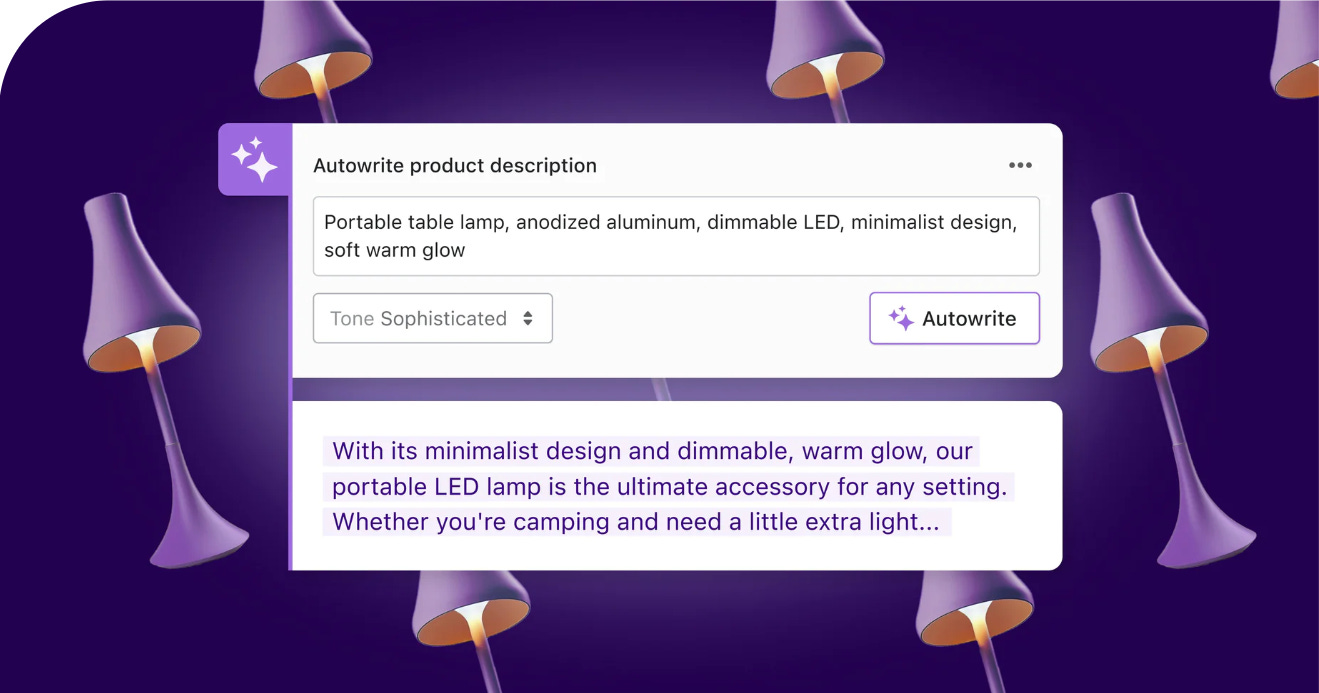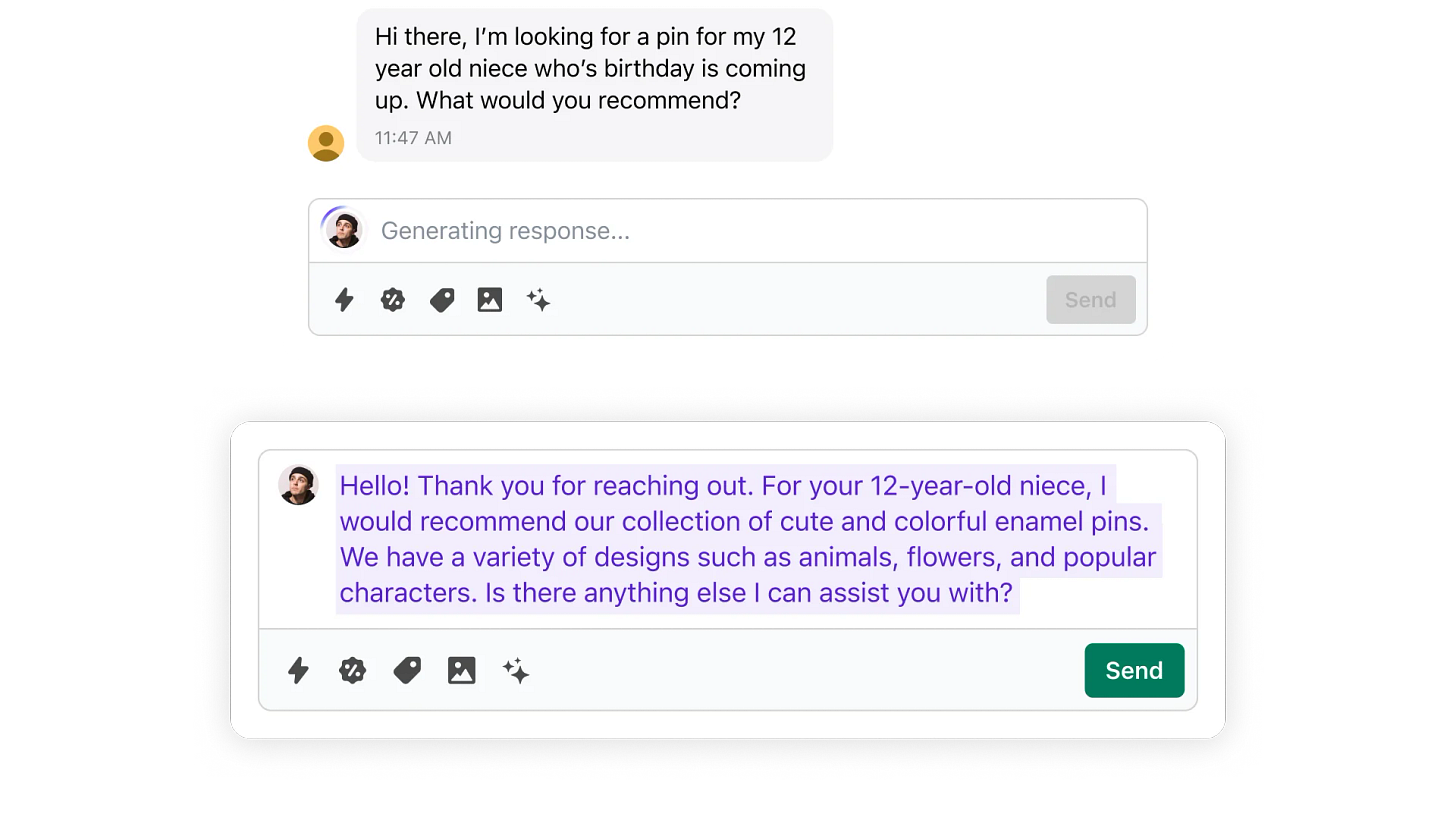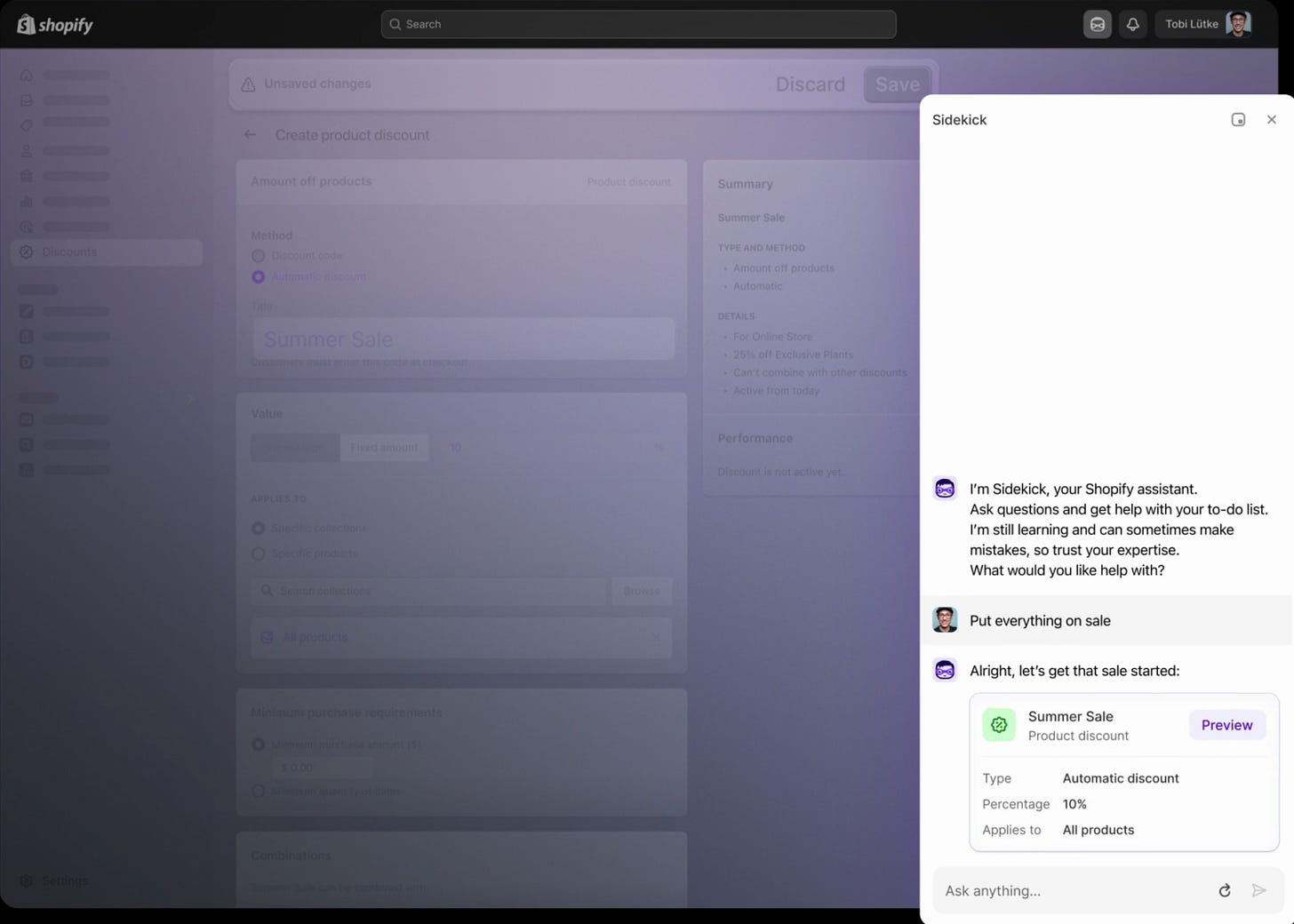How Shopify is making AI Magic
A case study on turning competitive advantages into useful AI.
Companies around the world are racing to add AI to their products. But one of the most impressive is Shopify, which has shipped a boatload of AI features over the past year. Despite being an 18-year-old public company with close to ten thousand employees, Shopify has several AI features already available - and is laying the groundwork for more.
The company is confirming that incumbent platforms stand to win big when it comes to AI - and is poised to help millions of entrepreneurs along the way.
Disclaimer: in case my bias wasn't obvious yet - I'm a big fan of Shopify. I've used it regularly for the past several years, and I've seen it go through many iterations. And while the product has had some misses1, it's one of the few platforms that I've used heavily that just works really well.
Why Shopify
From the outside, there are a couple of reasons why Shopify takes AI so seriously. The first is the founder and CEO, Tobi Lutke. Lutke is a technologist at heart - he built the first version of Shopify himself with Ruby on Rails, and he's admitted to hacking on side projects in his spare time. A quick glance at Lutke's Twitter feed2 shows that he's deeply engaged with AI right now - and this clearly informs Shopify's priorities as well. Shopify Editions, the company's semi-annual feature launch, had an entire section dedicated to AI.
But the other reason Shopify is taking AI seriously is because of how broad its platform is. Most people know Shopify as "the site to start an online store." Which is true - the company can help you create a website, list products, and take orders. But behind the scenes is a huge amount of additional capabilities that folks aren't aware of. App store apps, Point of Sale (POS) hardware, email marketing, B2B wholesaling, social media integrations, shipping carrier integrations, inventory management, fulfillment, internationalization, business banking/loans, credit/debit cards, NFTs, and business automations, to name a few.
So given all of these touchpoints, the company is uniquely positioned to apply AI in diverse ways for online merchants. They're just starting, but it's worth looking at what's already available.
Shopify Magic
On the merchant side, most of the AI features have been lumped into what's being called "Shopify Magic." Magic (so far) mostly consists of text generation (presumably via a large language model like GPT-3). Shopify first made this available for product descriptions in April, and has since added the capability to other aspects of the platform, including email marketing and online store customizations3.
But we can see where Shopify wants to take Magic - beyond simple text snippets and into entire emails and articles. Magic can write draft entire customer service responses inside of Shopify Inbox, the company's live chat feature. And it can learn from your previous chats, store policies, and order data to suggest FAQs for your store. Or, if you're looking for help with content marketing, Magic can write entire long-form blog posts given a topic and tone.
Shopify is also using Magic for summarization, not just generation. App store reviews are being distilled into concise summaries for users. And Shopify's own Help Center now has an assistant to answer questions based on existing knowledge base articles.
We’re seeing Shopify take advantage of at least three areas of text-based generative AI: generation, summarization, and semantic search. But there’s still a big bucket left: personalization.
Sidekick
Let’s talk about the most ambitious piece of Shopify's AI - Sidekick. One of the biggest competitive advantages for Shopify is their access to mountains of real-time merchant data. Entrepreneurs and online sellers have to pay attention to hundreds of different numbers, which is often too many to effectively manage. And it doesn't matter if a platform has all the bells and whistles if users have no idea how to operate them. "Insight fatigue" is real for business owners - dashboards and analytics are cool, but actions and trusted recommendations are often far more valuable.
Which is why Sidekick could actually be a pretty big deal. It's designed to help surface insights from across the Shopify admin, which, as we've discussed, is very broad. And the early previews look like it's able to take actions within that admin as well, to do things like generate a discount code or write a blog post. Having hooks directly into the platform makes Sidekick different from all of the thin wrappers around ChatGPT.
For what it's worth, Sidekick has a pretty compelling launch video4. Feel free to give it a watch:
What's next?
Sidekick is still in early access, but it's easy to see how Shopify plans to add more capabilities to the assistant. Many of the features detailed above can make it into the assistant: the key questions are how to surface relevant data in a timely way, and what actions Sidekick should be allowed to take. Here are a few areas where AI might be useful for e-commerce sellers:
Product recommendations: "I noticed these two items sell well together: have you considered upselling them with a discount code for the bundle?"
Inventory management: "I noticed X product is low on inventory and restocking typically takes a while. You should schedule a purchase order to buy more."
Dynamic pricing: "You haven't sold Y product in a while. I recommend running a Z% discount, what do you think?"
App installs: "It doesn't look like you're using the following apps. Do you want to uninstall them and save $X00/month? Also, this new app looks like it might be a good fit for your store."
Email marketing: "Your email open rate is down X%. Do you want to try A/B testing emails with a different tone?"
Financing: "Just so you know, you're eligible for up to $Y00,000 from Shopify Capital."
Shopify has the data and platform to get something like this off the ground. But perhaps more crucially, it has the user base to quickly generate tons of feedback and iterate on its AI. Previously, I wrote:
Incumbents that can get their AI act together have a massive advantage. I say "incumbents," and not "FAANG," because this playbook works across many verticals. Intercom has millions of support agents to improve its customer service LLM. Canva has millions of designers to improve its image generation. If CEOs of big platforms can develop a coherent AI strategy, they can build a flywheel to cement their advantage.
Shopify's moves in this space really reinforce my idea that existing software incumbents stand to gain the most from this new wave of AI advancements. If anything, Shopify is demonstrating that vertically-integrated incumbents are perhaps the best positioned of all. How many other e-commerce companies could plausibly offer the services above?
Stop hiding the search bars!
I refuse to call it X.
It's a little bit crazy how 12 months ago, these capabilities spawned billion-dollar companies like Jasper and Copy.ai, and now are becoming table stakes for SaaS platforms. Jasper recently announced job cuts and is refocusing on marketing use cases.
I’m also fully skipping over how well-aligned the marketing is for Sidekick. The entrepreneur-as-hero is a great framing and also works with how Shopify operates as a platform.












I also felt the launch video for Sidekick was promising when I first wrote about it. I'm looking forward to see whether it lives up to the hype in the end!
This is really cool to learn about, Charlie. It seems like Shopify is leading the AI race in several surprising ways; while ChatGPT and Anthropic are gobbling up headlines, they're rolling out a comprehensive platform that can do all the things.